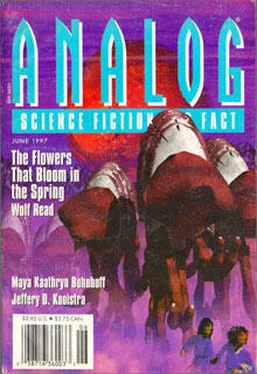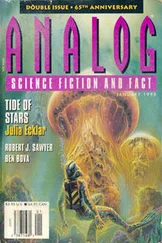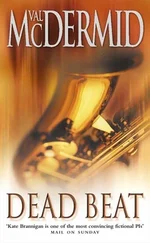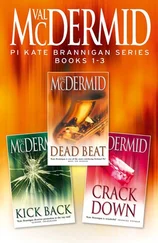Laurence Janifer - The Dead Beat
Здесь есть возможность читать онлайн «Laurence Janifer - The Dead Beat» весь текст электронной книги совершенно бесплатно (целиком полную версию без сокращений). В некоторых случаях можно слушать аудио, скачать через торрент в формате fb2 и присутствует краткое содержание. Год выпуска: 1997, Издательство: Dell Magazines, Жанр: Фантастика и фэнтези, на английском языке. Описание произведения, (предисловие) а так же отзывы посетителей доступны на портале библиотеки ЛибКат.
- Название:The Dead Beat
- Автор:
- Издательство:Dell Magazines
- Жанр:
- Год:1997
- ISBN:нет данных
- Рейтинг книги:4 / 5. Голосов: 1
-
Избранное:Добавить в избранное
- Отзывы:
-
Ваша оценка:
- 80
- 1
- 2
- 3
- 4
- 5
The Dead Beat: краткое содержание, описание и аннотация
Предлагаем к чтению аннотацию, описание, краткое содержание или предисловие (зависит от того, что написал сам автор книги «The Dead Beat»). Если вы не нашли необходимую информацию о книге — напишите в комментариях, мы постараемся отыскать её.
The Dead Beat — читать онлайн бесплатно полную книгу (весь текст) целиком
Ниже представлен текст книги, разбитый по страницам. Система сохранения места последней прочитанной страницы, позволяет с удобством читать онлайн бесплатно книгу «The Dead Beat», без необходимости каждый раз заново искать на чём Вы остановились. Поставьте закладку, и сможете в любой момент перейти на страницу, на которой закончили чтение.
Интервал:
Закладка:
If you were Josh—not a reason in the world why you shouldn’t. And every casual, sunny, satisfying reason why you should.
I got that far, and the back of my head nodded in some (and somber) satisfaction. And all the rest of me said: “Now, wait a minute. A teenage boy? Josh?”
The back of my head began churning out a list of known teenaged murderers. Known teenaged mass-murderers. It was quite a long list, and even when I narrowed it down to just a planet or two, it was not negligible.
“I don’t believe it,” the rest of me said.
“Of course you don’t,” the back of my head told me, in what was almost a friendly tone. “And neither will anybody else—all you have is an idea, just a free-floating idea—unless you can pin down just how Josh is doing all this.”
And that, it came to me sadly as I finished my gimlet and ordered one more for the long road back to my room, was a tune I had heard before.
Season subscribers were dying. Dying of diseases related to the circulatory system. Poison, despite the charm of poisoned tickets or poisoned rosin, seemed to be out, because no doctor had spotted any, and the list of Secret Poisons Unknown to Science has shrunk a lot since the Clean Slate War.
And what affects the circulatory system?
Sound will do it. Very, very loud sounds, for instance, will damage not only the ear but quite a lot of veins and arteries. The effect is especially pronounced in the head, but can occur anywhere—people have died from being tied helpless under large bells which went on bonging.
Unfortunately, the effect is not cumulative. Either it gets you or it doesn’t—if you walk away, and come back a second night for more loud sounds, you start effectively from scratch. There is a case to be made that there is some residual damage if the first bout was prolonged enough, but any residual damage would be so very damned small it would have no noticeable contribution to make to any second-time or eighth-time effect.
And what in God’s name could the Williamson have played that would have been that loud, to people merely sitting in good seats in the audience? That bit in the Berlioz Requiem for sixteen kettledrums wouldn’t do it. Nor would anything the orchestra could have played, I saw—or there would have been a lot of dead people anywhere the same piece was programmed.
I went on back to my hotel room. I sat there and thought for some time, while the gimlets wore off. The back of my head waited with its arms folded, looking superior.
Then, at about three in the morning, I picked up the phone and called Marietta.
Three in the morning, after a concert, is not a bad time to call a conductor. Most of them are very much awake, and still coming down from the excitement. Marietta’s voice was just starting to get back to normal tempos, with a few spells of rapid-fire still turning up, and when I asked her to come over she agreed with not the slightest hesitation.
Dimly, that bothered me. She could at least have been polite enough to pretend to worry about her honor.
But Marietta and I were old friends—and, damn it, nothing more. She arrived, and I fed her some oolong—coffee being contraindicated at three-forty A .M.—and sat her down on a sofa. I sat down in a chair nearby, and began to talk about sound.
Very, very loud sound, I said, could have real effects on the human body. She nodded. “What other kinds of sound might do things to people?” I said.
She thought for a minute. “Kinds of sound?”
“Well—overtones, for instance. Something a trumpet might do that a cello or a tambourine wouldn’t.”
Marietta shook her head. “As far as I know, nothing,” she said. “There might be some sort of effect, a specialist might know—”
“It can’t take a specialist,” I said. “Our murderer is in his teens, and his specialized knowledge is music.”
She stared at me. I told her what I had begun to think about Josh, and she strangled on a swallow of oolong.
“Josh?”
I laid it out. Slowly, very slowly, she began to nod.
“There was always something so—odd about him,” she said thoughtfully. “Single-minded. As if nobody and nothing else existed but whatever Josh was interested in.”
“Well,” I said, “he was doing his best to make that one come true.” I shook my head. Around Marietta one does not smoke, so I didn’t. Determinedly. “But how in Hell was he doing it?” I said. “What would affect people like that? What sort of sound?”
Marietta shut her eyes. It’s how some people think. After almost a minute she opened them and said: “A sound you can’t hear.”
My turn to stare. “A what?”
“Well, for instance,” she said. “Almost nobody can hear sixteen cycles per second. Too low. Some people can—I can—but most can’t, and go below rhat and nobody can. But broadcast a nice, loud sixteen cps, and people who can’t hear it at all will get very nervous. Afraid. Make it loud enough, for a couple of hours., and I think you could cause panics.”
“Exactly y’cteen?” I said. I remembered dimlv wondering about subsonics, a long, long time before, altogether too damned long a time before. The back of my head did not have to say Idiot at me. I was doing the job all by myself.
“It would have to be very close,” Marietta said. “Make it, say, fourteen instead, and you—” She stopped with the cup halfway to her lips. “Oh, my God,” she said very quietly.
I took a very deep breath. “Oh my God what?”
“At fourteen, you can get circulatory damage,” she said.
There was a little silence while I cursed myself (a) for abandoning that thought a full damned week before (and more), and (b) for letting Josh go home with his little suitcase. Then I said: “But—if he broadcast fourteen cps—wouldn’t somebody notice? It wouldn’t be a sound. But it would be something, and something very unusual. And the actual sounds would interfere—hash up his signal. Even if nobody noticed, there’d be too much interference; it wouldn’t work.”
Marietta shook her head. “He isn’t broadcasting fourteen cps,” she said.
He’s broadcasting long, held notes the orchestra is playing. Lots of them, in every piece ever written, very nearly. He’s broadcasting those—almost.”
And of coursd he was. When we got to his apartment, nearly five in the morning, the little suitcase proved it.
Josh knew the scores very well. And he knew the orchestra just as well. Some orchestras tune to a 440 A, some to a 448, some to a 435. Josh knew the Williamson tuning, exactly.
He attended rehearsals when he could. He knew the tempos Marietta would use for a given piece on a given program.
And he set his machine—not a complicated one, you can make one out of most simple sound systems—to play just fourteen cycles out of key with long notes in piece after piece.
As long as he stood near the second-balcony rail, he could blanket the orchestra seats with the beat note—the fourteen-cps difference between what the orchestra was playing and what he was sending—and never be detected. The volume didn’t have to match, and if anyone heard his small-volume broadcast it would go down as an acoustic glitch in the hall, of course. The people behind him wouldn’t get much, if any at ail, any more than he would—he had directional speakers, of course, nicely miniaturized, or he himself would have been dead long before—and Marietta and the orchestra, far ahead of him, got a sound so attenuated that it would have taken better ears than hers to pick it up. Human beings do not have much better ears than hers.
That effect was cumulative. The more fourteen-cps sound you took in, over time, the sicker you were likely to get. Season subscribers would, of course, take in the most.
Читать дальшеИнтервал:
Закладка:
Похожие книги на «The Dead Beat»
Представляем Вашему вниманию похожие книги на «The Dead Beat» списком для выбора. Мы отобрали схожую по названию и смыслу литературу в надежде предоставить читателям больше вариантов отыскать новые, интересные, ещё непрочитанные произведения.
Обсуждение, отзывы о книге «The Dead Beat» и просто собственные мнения читателей. Оставьте ваши комментарии, напишите, что Вы думаете о произведении, его смысле или главных героях. Укажите что конкретно понравилось, а что нет, и почему Вы так считаете.












